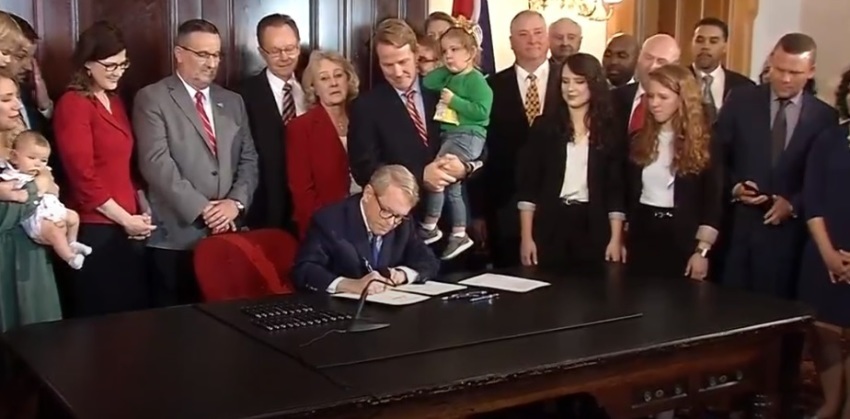Ohio governor signs heartbeat abortion ban into law

Ohio Governor Mike DeWine signed a bill into law that would prohibit abortions for unborn babies that have a detectable heartbeat, which can be found as early as six weeks into a pregnancy.
"The essential function of government is to protect the most vulnerable among us — those who do not have a voice," DeWine said just before signing Senate Bill 23, or the Ohio Human Rights and Heartbeat Protection Act, into law on Thursday afternoon.
"Government's role should be to protect life from the beginning to the end, to protect those who cannot protect themselves, such as the elderly, the unborn, those who are sick, those who have a disability, those who have a mental illness, or an addiction."
Ohio’s SB 23 passed 56-40 in the House and then 18-13 in the Senate on Wednesday, with local media reporting protests from both sides outside of the legislative chamber.
Mark Harrington, president of the pro-life group Created Equal, emailed a statement out to supporters hours before the signing, saying that it was a “historic day.”
“The legislature and Governor DeWine have declared that no longer should the beating hearts of humans too young to be born be violently torn apart by abortion,” stated Harrington.
“If pro-abortion lobbies present a legal challenge to this Act, we will defend these babies all the way up to the Supreme Court. Changes on the bench signify an even better day for preborn babies may be on the horizon.”
The American Civil Liberties Union of Ohio denounced the new law, vowing that they would sue to stop the law from taking effect.
“This legislation is blatantly unconstitutional and we will fight to the bitter end to ensure that this bill is permanently blocked,” said Freda Levenson, legal director at the ACLU of Ohio.
“SB 23 is one of the most aggressive, oppressive, and radical attacks against women ever seen in this state and this country. A nearly identical bill in Kentucky was just struck down by a federal judge – we feel confident our impending litigation will ultimately prevail.”
Last year, the Ohio Legislature passed a similar measure. However, then Governor John Kasich vetoed the bill due to concerns over prolonged litigation.
The state Senate failed to override the veto last December, missing the necessary 20 vote-minimum when they got only 19 votes in favor.



























